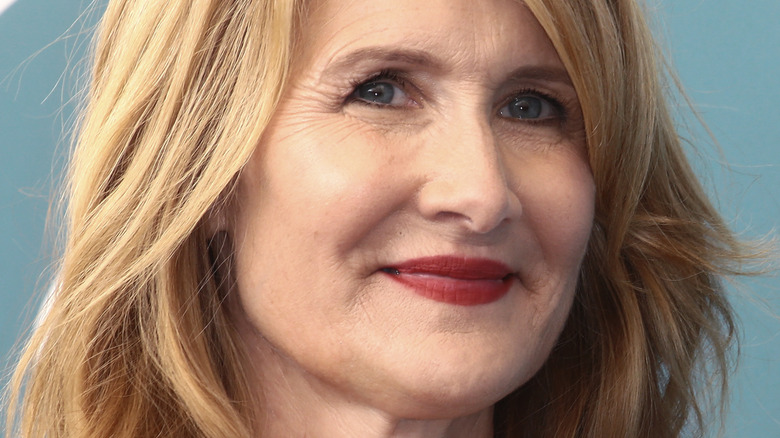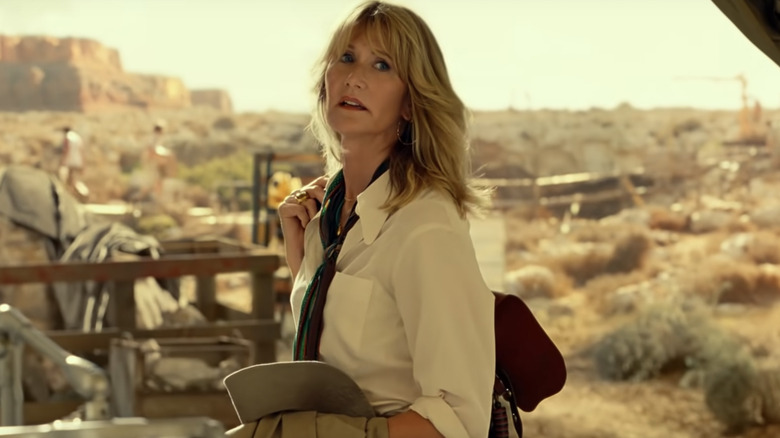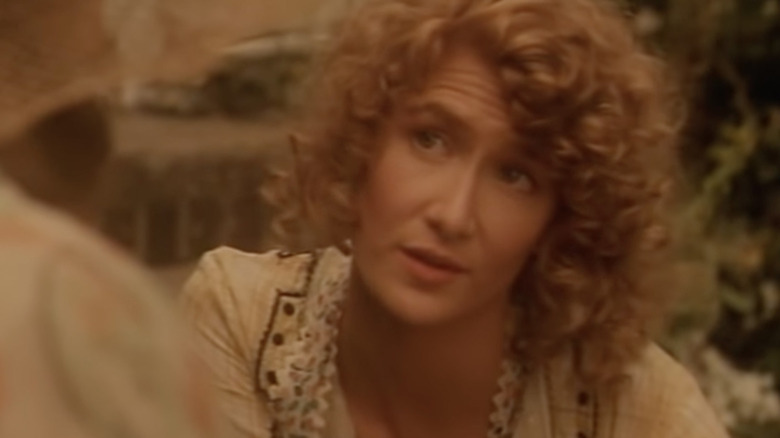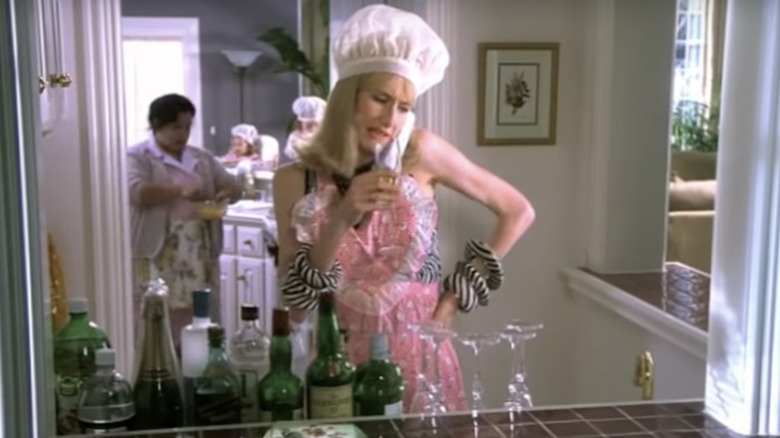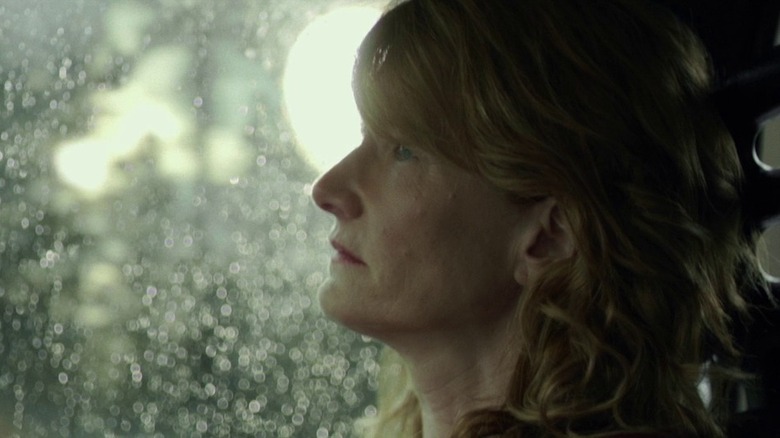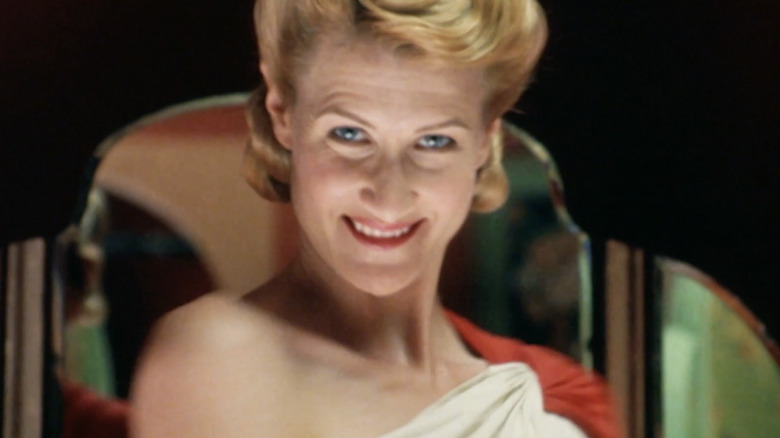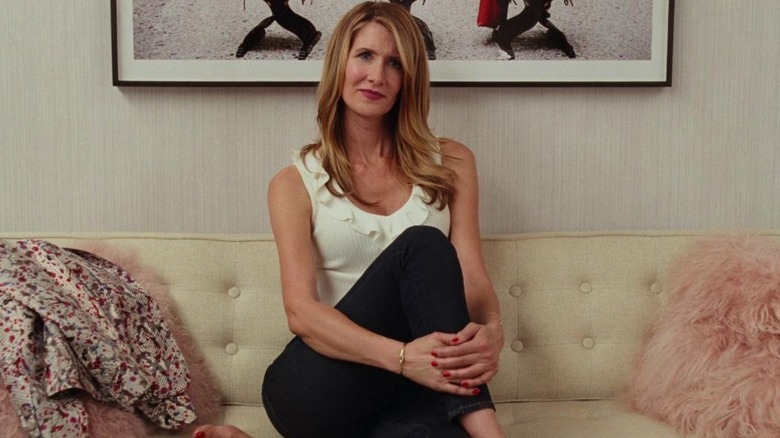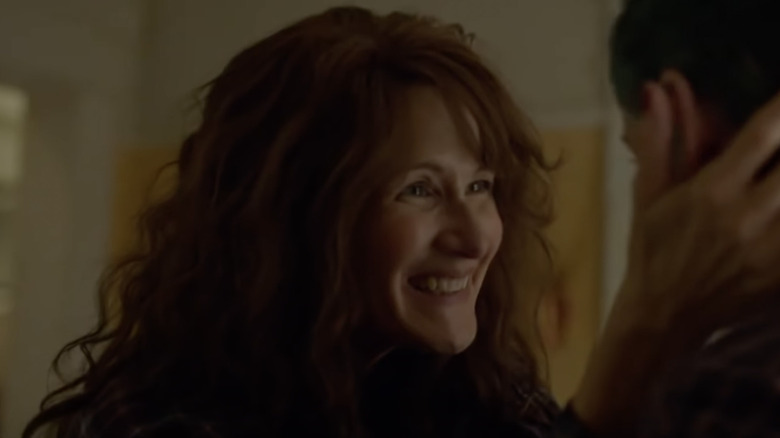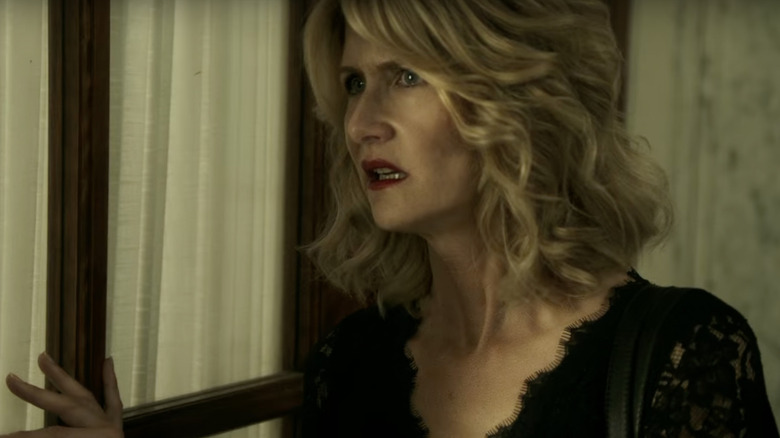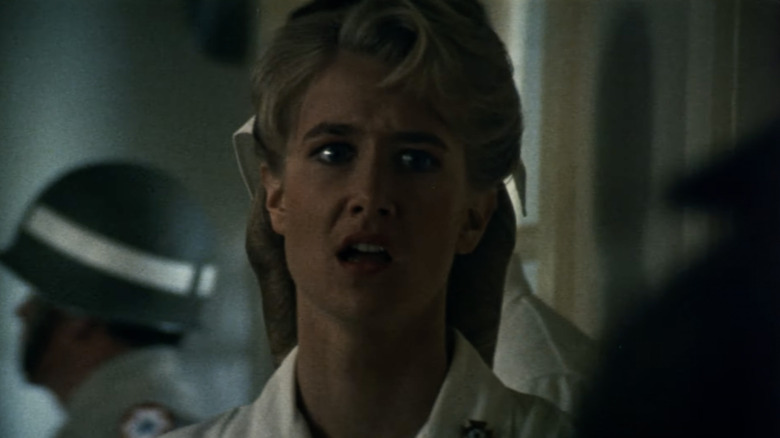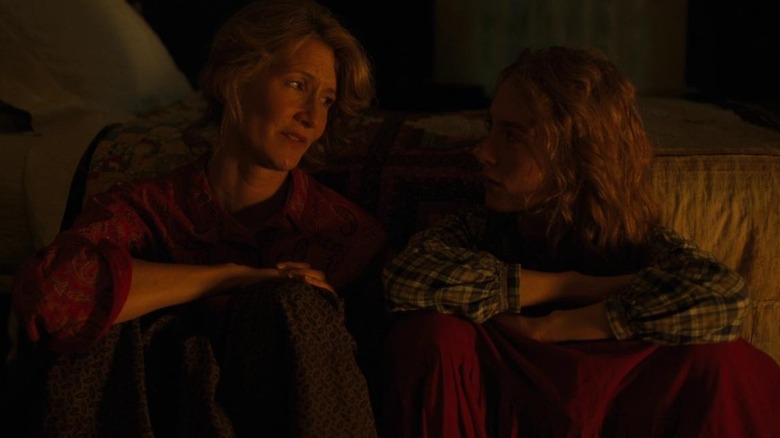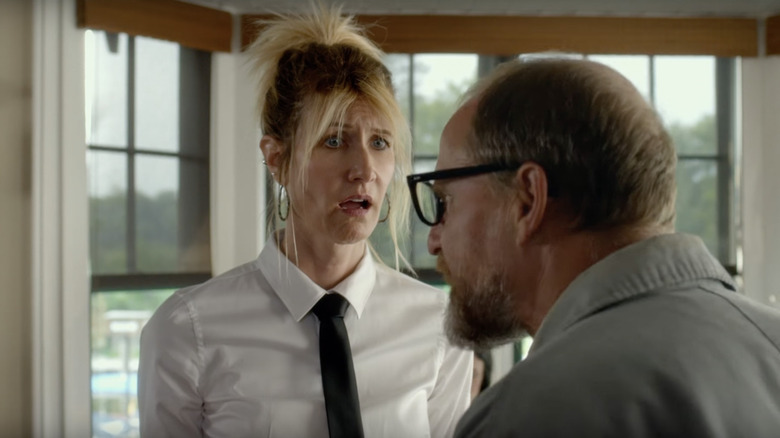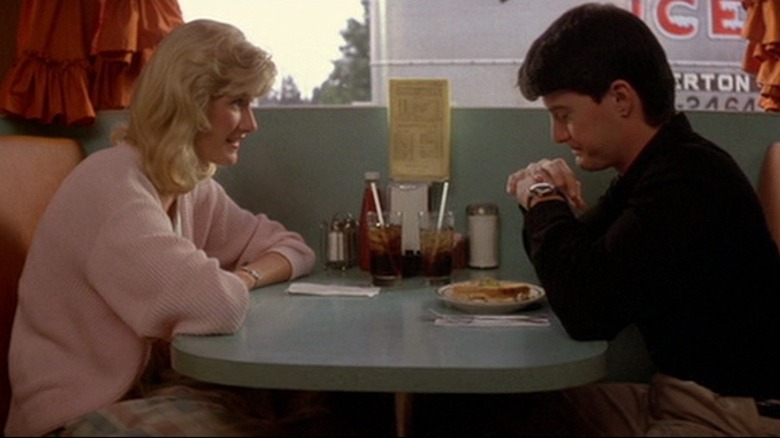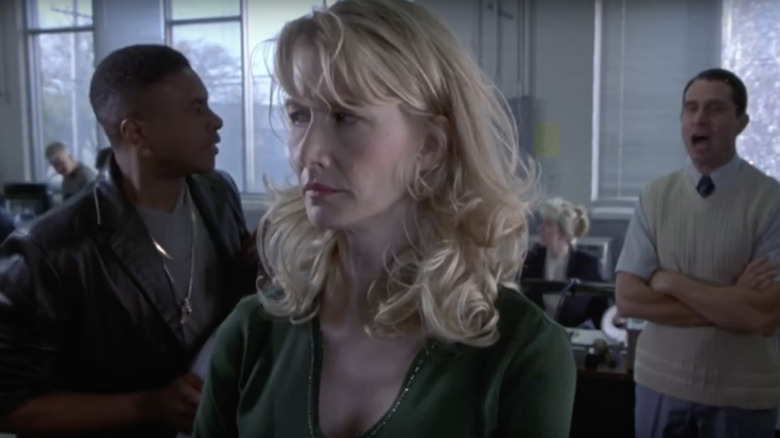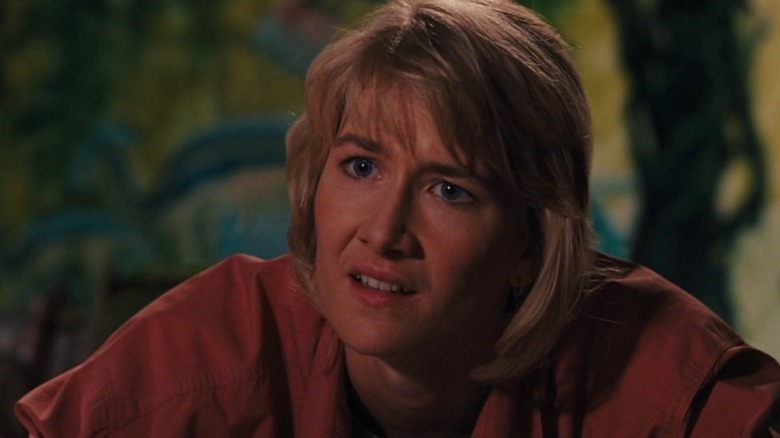Laura Dern's 7 Best And 7 Worst Movies Ranked
As the daughter of screen legends Bruce Dern and Diane Ladd, Laura Dern obviously had a head-start in Hollywood. Almost as soon as she began her career, however, her high-caliber work made it clear that she was a star in her own right: versatile, intense, funny, and unforgettable.
She acts, as a New York Times appreciation of her said, with her whole body and her whole mind, with naked emotion and commitment conveyed with all the expressiveness of a physical comedian and all the deftness of a top-notch dramatic actor: "Behind each moment is a steady, probing intelligence holding it together, so that what would otherwise come off as camp or hysterical is in fact grounded, layered, strange, human, and almost unbearably vulnerable." When she's on the screen, it's hard to imagine ever looking away from her, and it's even harder to imagine finding a false note in one of her performances.
Laura Dern's career is stacked with beloved blockbusters and critically acclaimed auteur pieces and punctuated by the occasional quirky flop. Let's take a look at her best and worst movies — and remember that even the bad ones are improved by her presence.
Worst: Jurassic World Dominion
The reunion of the complete original "Jurassic Park' trio had us eagerly anticipating 2022's conclusion to the "Jurassic World" trilogy. Suffice to say, we were disappointed.
"Jurassic World Dominion" was a seriously mixed bag, and with our favorite characters from the original all back on screen together, it's easy to think about how we'd rather just be watching "Jurassic Park." This rambling and overstuffed plot inexplicably puts dinosaurs on the backburner and mostly gives us prehistoric locusts instead — along with an over-the-top and overheated Biosyn storyline that feels like it would be more at home in a James Bond movie.
As bad as it is, the one diamond in all this rough is having Sam Neill and Laura Dern back in the franchise again. Variety condemned the film with faint praise, saying, "Of the three 'Jurassic World' movies, 'Dominion' is the least silly and most entertaining. But that's not saying much." However, the publication admitted, "For slightly older audiences, this [Neill-Dern] reunion is a gift, recombining the chemistry that worked nearly three decades ago." This is a common refrain in "Jurassic World Dominion" reviews, with the Chicago Tribune's ending in a similar shrug: "It's seriously nice to see Dern and Neill again, though, even amid routine material handled routinely."
And that's who Laura Dern is to us — someone who can't help making our movie experience better.
Best: Rambling Rose
With box office earnings that didn't even equal its modest budget, 1991's "Rambling Rose" isn't that well-known ... but, like its central character, it still finds plenty of admirers. All Movie's Brian J. Dillard described the film as "charming but bawdy, old-fashioned but politically progressive ... a study in contradictions."
The movie tells the Great Depression-era story of Rose (Laura Dern), who comes of age working for the caring but flawed Hillyer family. Rose wants love and acceptance, but she chases it through seduction — first with the flustered Mr. Hillyer (Robert Duvall) and then with a seemingly endless string of men. While Mr. Hillyer frets over the family's reputation and wonders how to contain Rose's sexuality, 13-year-old Buddy (Lukas Haas) fixates on her and is drawn into his own (sometimes troubling) sexual awakening.
Laura Dern received an Academy Award nomination for Best Actress for her remarkable and fearless work as Rose. Eye for Film explained her approach, saying, "Laura Dern plays [Rose] like a child remembering what it is to be a lady from listening to someone talk of an actress in a film she hasn't seen. ... [She] triumphs in the end with a vulnerability that is both vital and captivating." When the Hillyers end the film by saying that she'll never be forgotten, we believe them.
Worst: Dr. T and the Women
It's safe to say that "Dr. T and the Women" isn't one of Robert Altman's best films. It's a rambling, absurdist comedy about a gynecologist — the titular Dr. T, played by Richard Gere — who's surrounded by women both on and off the clock. His wife (Farrah Fawcett) has reverted to mental childhood, his eldest daughter (Kate Hudson) is secretly in love with her own maid of honor (Liv Tyler), his sister-in-law (Laura Dern) is a constant headache, and his assistant (Shelley Long) wants to seduce him by disrobing in his office. Dr. T would like to help them all — and romance the independent Bree (Helen Hunt) — but it's not going all that well.
The movie aims for whimsical screwball comedy and instead produces broad, painfully unfunny scenes that are too often full of wince-worthy sexism. As Reelviews' James Berardinelli said, "While it's impossible to call anything fashioned by a man of Altman's skill unwatchable, there are times when this pedantic and dull effort comes close."
Dern salvages her part, however. Rolling Stone — one of the few critical outlets that enjoyed the film overall — even called her one of the film's "scene-stealers" and credits her with "[finding] the grieving core in a character that a lesser actress would play for facile laughs." Conveying a powerful sense of humanity is one of Dern's great strengths as an actress, and it's good to have that recognized.
Best: Wild
Beautifully shot and emotionally raw, "Wild" follows Cheryl Strayed (Reese Witherspoon) on her attempt to hike the Pacific Crest Trail. It's an advanced and often grueling trail, and she's an amateur hiker traveling solo, but her long, mishap-ridden journey feels like a psychological necessity ... and maybe even a life-saving one. She's had a rough time lately. After her mother, Bobbi (Laura Dern), died, Cheryl self-destructed in slow motion. Now it's time to try to gather up the pieces.
Bobbi is a consistent presence in the film, just as she is in her daughter's mind. Flashback scenes reveal a complex mother-daughter relationship that could be tender, contentious, admiring, and more. In order for the film to work as well as it does, we have to genuinely share some of Cheryl's grief. Dern makes sure that's not a problem.
"Wild" is a standout film in Dern's career, and it justly earned her an Oscar nomination for Best Supporting Actress. RogerEbert.com critic Susan Wloszczyna described her as "quite fabulous as Bobbi, a human sunbeam who radiates unconditional love for her children after leaving behind an abusive marriage." By showing Bobbi's ability to go on finding beauty despite plenty of pain and disappointment, Dern makes her feel both real and heroic. You can see why her daughter wants to embrace some of her lessons.
Worst: Focus
The somber, well-intentioned "Focus" isn't a particularly bad film. It's just a clumsy one that insists on using a sledgehammer when a scalpel might work better. While the anti-Semitism the movie explores is unfortunately still alive and well, the deliberately old-fashioned way "Focus" handles the subject is unlikely to leave a mark on more contemporary audiences.
William H. Macy stars as the mild Larry Newman, whose new pair of glasses make him "look Jewish." Since he isn't, he has a rocky introduction to the seething undercurrents — and often explicit championing — of anti-Semitism. Now that it's directed at him, he feels it acutely. It puts him on edge and pushes him to the edge, forcing him to reckon with the world he really lives in. It could have been an immensely powerful film ... if it had been made in the 1940s and not simply set there. Exposing rampant prejudice in the past doesn't always help people see how it still exists in the present, and that leaves "Focus" as a film that prioritizes its message but doesn't meaningfully convey it.
Strong performances are the movie's saving grace, and Laura Dern makes a good showing as Gertrude, Larry's female counterpart and eventual wife. As The Austin Chronicle put it, "Macy and Dern are exquisite in the scenes they share together. These two actors ... lend the piece its only real naturalism and gracefulness."
Best: Marriage Story
Actress Nicole (Scarlett Johansson) and theater director Charlie (Adam Driver) were once deeply in love, but their marriage slowly splinters because of competing priorities, resentments, emotional neglect, and eventual infidelity. An increasingly vicious custody battle over their young son only intensifies things.
"Marriage Story" lays the divorce process bare, portraying its ugliness unflinchingly — but also showing that it doesn't end the possibility of all fondness and understanding. At the end of the day, Charlie and Nicole's divorce is bittersweet, not just embittering. This tonal complexity makes the film deeply affecting. As The New York Times put it, "It's funny and sad, sometimes within a single scene, and it weaves a plot out of the messy collapse of a shared reality, trying to make music out of disharmony. The melody is full of heartbreak, loss and regret, but the song is too beautiful to be entirely melancholy."
Laura Dern shines as Nora Fanshaw, Nicole's cutthroat lawyer. Collider praised her work here, noting, "Dern is electric as Nora. .... She's callous in all the right ways for her profession, and in the hands of a lesser actor, she would just be a caricature, but with Dern, we just have to acknowledge that Nora is amazing at her job." It's a magnificent performance that finally got Dern a long-deserved Oscar win for Best Supporting Actress.
Worst: JT LeRoy
There's nothing "JT LeRoy" can do about its bizarre and overly complicated story. It's stuck with the truth, and in this case, the truth of this elaborate literary hoax is exactly that weird.
When writer Laura Albert begins to publish her work, she frames her Southern gothic novels as memoirs — the work of a young man named JT LeRoy. Her books become such a sensation that Albert coerces the young Samantha Knoop (Kristen Stewart) into making public appearances as the reclusive, ambiguous JT. Dern shines when it comes to exploring the intimate and toxic relationship between Albert and Knoop, with The New York Times saying, "Few actors inhabit the space between charming and monstrous as brilliantly as Dern does."
It's all a complicated shell game played out in a hall of mirrors, and its material has a lot of intriguing themes buried within it: gender, creativity, trauma, exploitation, codependence, truth, and fame. It would be a stretch, though, to claim that "JT LeRoy" does much with those themes. They just sort of messily exist around the edges of a plot that, real or not, feels excessive and hard to buy. Maybe when the truth is stranger than fiction, it's hard to make it into good fiction.
Best: The Tale
Powerful and hard to watch, "The Tale" is a terrific showcase for Laura Dern's dramatic skills. She takes center stage here and gives a revelatory performance that's ragged, poised, hurt, angry, uncertain, and everything in between.
Dern plays Jennifer Fox, a documentary filmmaker who must turn her attention to the story she's spent years repressing, editing, and dismissing — her own childhood. The memories come crashing home when her mother finds an old school assignment where a 13-year-old Jenny had laid out part of the truth: She was "dating" her middle-aged coach, who'd repeatedly sexually assaulted her while framing this as romance. Young Jenny thought she'd put this "relationship" behind her for good, but all she did was move on and deny that she'd gone through anything traumatic. Now, Jenny goes on a difficult quest to confront her past, including her abuser ... but in this all-too-realistic film, there's no such thing as easy catharsis.
The New Yorker praised the film, saying, "'The Tale' is lit up by a clarifying anger, but it has a stirring, inspiring streak. .... [It's] certainly a hard watch, the kind that trigger warnings were designed for. But it's made for this moment." It's bold and layered, emotionally wrenching and intellectually complex, and Dern helps capture all its complexities.
If you or anyone you know has been a victim of sexual assault, help is available. Visit the Rape, Abuse & Incest National Network website or contact RAINN's National Helpline at 1-800-656-HOPE (4673).
Worst: Fat Man and Little Boy
1989's clunker "Fat Man and Little Boy" snatches defeat from the jaws of victory. It features several strong actors, and its subject matter — building the first nuclear weapons — comes with plenty of built-in tension and moral ambiguity. "Fat Man and Little Boy" squanders all that to become dumbed-down, sanitized, and dull. Roger Ebert exacerbated it for gutting the real-life story of both its intelligence and its conflicts, and Washington Post critic Desson Howe wrote that, "[It's] not resoundingly disastrous. That would imply a certain energy. Its effect is more innocuous than lethal."
Laura Dern is stuck with the underdeveloped role of Nurse Kathleen Robinson, who's mostly in the movie to love John Cusack's doomed Michael Merriman and witness his slow and painful death from radiation poisoning. While it should be a forgettable part, Dern is the inverse of the movie she's in. While "Fat Man and Little Boy" saps the life out of a dramatically rich premise, she gives depth and meaning to a mediocre role. That didn't go unnoticed by critics either. While Deseret News critic Chris Hicks didn't like the film, he did write, "Laura Dern is also effective as the nurse in love with Cusack, a sappy role that she invests with a great deal of dignity."
Nothing, however, can give "Fat Man and Little Boy" any dignity of its own. This is a thoroughly middling dramatization of a slice of history that deserves a much more complex portrait.
Best: Little Women
Greta Gerwig's warm and spirited 2019 adaptation of "Little Women" manages the difficult task of updating some of the story's concerns while keeping its heart and vivid characters intact. With their father away during the Civil War, the March sisters — mature and ladylike Meg (Emma Watson), rebel-at-heart writer Jo (Saoirse Ronan), sweet and shy Beth (Eliza Scanlen), and difficult but passionate Amy (Florence Pugh) — grow up mostly under the amused and loving care of "Marmee" (Laura Dern), their beloved mother. Over the years, the film's fluid, nonlinear storytelling reveals the girls' fates, including the different paths they take to happiness.
The original novel is a beloved classic for a reason, and this movie captures what makes it tick — and even adds welcome new touches that reveal different facets of the characters and their world. As IndieWire puts it, "Gerwig's 'Little Women' offers its own delightful storybook polish, in its own unique terms, and what a comfort that is."
The whole cast shines, and while it's not the most complex role, Laura Dern makes an excellent Marmee — a kind of ideal mother but still human and nuanced. Her chemistry with her on-screen daughters and husband (Bob Odenkirk) is pitch-perfect. NPR correctly deems her a "warm, anchoring presence," making her perfect as the embodiment of the home that the girls must grow out of — but will always have in their hearts.
Worst: Wilson
An awkward and acerbic family reunion takes center stage in "Wilson." Wilson (Woody Harrelson) and Pippi (Laura Dern) have been divorced for years, but a melancholy and abrasive midlife crisis leads them to reconnect — and prompts Pippi to reveal that they have a daughter, Claire (Isabella Amara), who's been brought up in foster care. Wilson decides that the three of them should try being a family. Let's just say that it doesn't exactly go smoothly.
"Wilson" travels a well-worn path, and it doesn't come up with anything new. It may be solidly executed, but it's a string of clichés that never really transforms into anything fresh. The Film Frenzy summed it up nicely, saying, "Sentiment quickly takes the place of cynicism, and, despite the occasional flash of brutal wit, the film settles into a well-worn groove of indie preciousness." As soon as it really gets going, you start to feel like you've seen it all before.
Harrelson is the undisputed star here, but Laura Dern more than holds her own. Fangirl Freakout even positions her, and her rapport with Harrelson, as the film's brief saving grace, but adds, "Once Laura Dern's character leaves the film, she takes the fun with her." The spark just goes out, and everything else fizzles.
Best: Blue Velvet
David Lynch's surreal noir classic "Blue Velvet" begins with a young man — Kyle MacLachlan's Jeffrey — finding a severed ear in a field. It's the first real hint of what lies beneath his hometown's idyllic appearance. Investigating only leads him to the blackmailed and abused Dorothy (Isabella Rossellini) and the bizarre and sinister Frank (Dennis Hopper). Sandy (Laura Dern), the kind-hearted daughter of a local cop, helps Jeffrey probe into this bleak and dangerous — but sometimes hypnotic — world.
With a dreamy otherworldliness and a shocking intensity, "Blue Velvet" explores the darkness that lies in every place and inside every person. It's both a viscerally disturbing thriller and a powerful look at innocence, evil, sex, love, and corruption. The Guardian's initial review summed up the film's uniquely unsettling power: "Love it or hate it, see it you must. Nothing remotely as unhealthy has come out of Hollywood for years but also nothing that so upends our usual expectations of the commercial cinema."
Laura Dern's work as Sandy is pivotal to the film since Sandy needs to convincingly represent the "light" side of the world without ever making her sunny goodness feel trite or sentimental. She makes it work, and the LA Times lauded both her performance and her interaction with MacLachlan: "It's the voltage and absolute belief of Dern and MacLachlan that keep the film on its rock-steady even keel. ... Dern, the story's anchor woman, balances the romantic melodramatics of a high schooler with a nice, dry level-headedness."
Worst: Novocaine
If you want to see the absolute rock bottom of Laura Dern's filmography, we must reluctantly direct your attention to "Novocaine."
To put it bluntly, this movie is a mess. Steve Martin as a dentist who gets haplessly caught up in an elaborate noir plot involving stolen drugs and frame-ups sounds like it should be good, and when you throw in Helena Bonham Carter and Laura Dern, it sounds even better. Unfortunately, "Novocaine" can't tell when enough is enough. It adds "thrilling twists" until its plot has all the structure of spaghetti, and it goes so far afield in search of visual flair that it subjects you to more dental X-ray shots than anyone ever needs. In the end, you're left with a headache and the baffled feeling that had to be longer than a mere 95 minutes.
Despite all that, die-hard Laura Dern fans will want to tough it out through "Novocaine" because she's perfect in the role of Jean, hygienist and fiancée to Steve Martin's Frank. And the same sloppily scripted twists that make the plot a disaster give Jean a chaotic complexity that Dern can mine for all she's worth. As Salon's Stephanie Zacharek put it, "Somehow, when Laura Dern is on-screen, the movie manages to make temporary peace with itself." She makes it the kind of film it wants to be.
Best: Jurassic Park
Affable billionaire John Hammond (Richard Attenborough) is nearly ready to debut the groundbreaking Jurassic Park, a theme park and nature preserve he's kept carefully under wraps. First, however, he needs to convince skittish investors that his park is safe. Why are they worried? It turns out that Hammond's private island is teeming with genetically engineered dinosaurs. Now paleontologist Alan Grant (Sam Neill), paleobotanist Ellie Sattler (Laura Dern), and chaos expert Ian Malcolm (Jeff Goldblum) must evaluate the park ... something which goes horribly awry when industrial espionage and a bad storm combine to let all the dinosaurs loose.
The result is a pleasure to watch. It's thrilling, funny, scary, and full of now-iconic characters played by incredibly charismatic actors. Its action sequences are mini-masterpieces of the genre, and its effects remain breathtaking.
As Empire puts it, "Cliché or no, there's no getting around it — ['Jurassic Park' is] quite simply one of the greatest blockbusters of all time." Upon its original release, reviews often found the characterization to be the weakest part of the film, but retrospective pieces are more appreciative of how well these performances have lasted. Collider's 25th anniversary piece ruled, "It's absolutely the right cast, and they all have perfect approaches to their characters." It's also a great role for Dern, who gets a nuanced character — smart, tough, funny, and thoroughly human — and a good blend of action and quiet character moments. Honestly, in the entire "Jurassic Park" franchise, Dern's performance might be the best.
